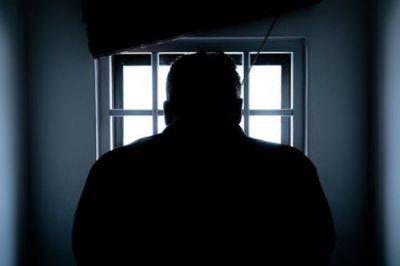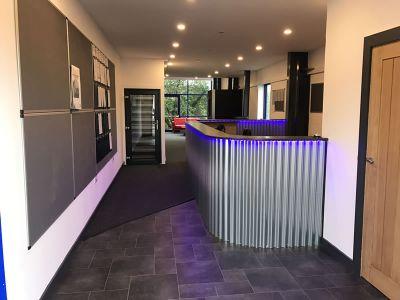Manufacturers of Vocal Booths
and Sound Isolation Enclosures
UK Freephone: 0800 170 1271
International: +44 (0) 7300 332 268
Email: Sales@kubevocalbooth.com
Follow Us:
Court Booths & Court Sound Isolation Enclosures

After a recent amendment the government is to allow offender and witnesses to undertake virtual court hearings from purpose-built court booths in court buildings. The idea is to counter threats to either witnesses or offenders from public view or the gallery in a court. The new rules are especially important for witnesses who would like to remain anonymous and would otherwise not testify in court.
A witness can testify from the court booth via a video and audio link. In addition the testimonies can be conducted from court sound isolation enclosures away from the actual court. Indeed the testimony could be conducted from anywhere in the world. A Kube sound isolated court booth ensures that a witness testimony cannot be overheard by anyone standing outside the booth.
A KUBE court booth can easily be dismantled and relocated to another area within a matter of hours.
What is a Court Sound Booth?
A court sound booth, also known as a witness box or witness stand, is an enclosed area within a courtroom where witnesses testify during legal proceedings. It is designed to provide a controlled environment for witnesses to give their testimony while ensuring their privacy, security, and optimal audio recording.
When selecting a sound booth for use in a court, there are several important factors to consider. Here are some key aspects to look for:
Soundproofing: The primary purpose of a sound booth is to isolate the witness's voice and minimize external noise. Look for a booth with effective soundproofing materials and construction, such as thick walls, acoustic insulation, and sealed doors and windows. It should provide a high degree of sound isolation to prevent interference from the courtroom or outside environment.
Acoustic Treatment: The booth should have proper acoustic treatment to enhance sound quality within the booth. This includes elements like sound-absorbing panels, diffusers, or other treatments that help control echoes, reverberation, and unwanted reflections. Good acoustic treatment ensures clear and intelligible audio recordings of the witness's testimony.
Visibility and Security: Consider the design features that provide visibility and security for both the witness and the courtroom. One-way glazing or screens can allow the witness to see the courtroom while minimizing direct visual contact with the defendant or audience. This helps protect the witness's privacy and ensures their safety.
Ergonomics and Comfort: The booth should be designed with the comfort and convenience of the witness in mind. It should have adequate space to accommodate the witness, seating, and any necessary equipment, such as microphones or monitors. Comfortable seating and appropriate lighting should be provided to ensure the witness can focus on their testimony without distractions.
Accessibility: Consider the accessibility features of the sound booth. It should be accessible for individuals with disabilities, complying with relevant accessibility standards. This includes features such as wheelchair access, adjustable seating, and appropriate accommodation for individuals with hearing impairments.
Integration with Technology: Modern courtrooms often rely on audio-visual technology for recording and presenting evidence. Ensure that the sound booth can integrate with the courtroom's audio and video systems seamlessly. It should have provisions for microphone connectivity, audio/video recording equipment, and interfaces to facilitate easy integration with the courtroom technology infrastructure.
Maintenance and Durability: Look for a sound booth that is durable, easy to clean, and requires minimal maintenance. The materials used should be robust and resistant to wear and tear. Consider the manufacturer's reputation, warranty, and customer support to ensure the booth will remain in good condition over time.
Compliance with Regulations: Check if the sound booth complies with any relevant legal or regulatory standards. This may include guidelines related to sound transmission, safety, accessibility, fire safety, or any other requirements specific to your procedures. It's advisable to consult with court officials, audio-visual experts, or professionals experienced in courtroom design and technology to help you select the most suitable sound booth that meets your specific court's needs and requirements.
Why is a sound booth an important tool for court hearings and what are the adavantages?
Sound booths, also known as witness boxes or witness stands, are important features in courtrooms for several reasons:
Privacy and Security: Sound booths provide a controlled environment for witnesses to testify. They help ensure the privacy and security of the witness, shielding them from direct contact with the defendant, the jury, or the public. This separation helps witnesses feel more comfortable and protected, especially in cases involving sensitive or high-profile matters.
Witness Concentration: Sound booths help witnesses focus on their testimony by minimizing distractions from the courtroom environment. By reducing visual stimuli and isolating them from the audience, witnesses can better concentrate on providing accurate and unbiased testimony, free from external influences.
Witness Protection: In certain cases, witnesses may require protection due to their involvement in criminal activities or their testimony against dangerous individuals. Sound booths can be designed to enhance witness protection by concealing the witness's identity or disguising their appearance, such as using one-way mirrors or screens.
Audio Quality: As mentioned above, sound booths are acoustically engineered to optimize sound transmission and reduce background noise. They have soundproofing materials and insulation to ensure clear audio recording of the witness's testimony. This is crucial for accurate court proceedings, as it allows judges, attorneys, and jurors to hear the witness clearly and prevents misunderstandings or misinterpretations.
Control of Testimony: By placing witnesses in sound booths, the court has better control over their testimony. It allows the judge to regulate the proceedings more effectively by preventing witnesses from being influenced by other witnesses' testimonies, media coverage, or the reactions of the courtroom audience. The controlled environment helps maintain the integrity and impartiality of the legal process.
Equality and Fairness: Sound booths contribute to equal treatment of witnesses by providing a standardized setting for testimony. All witnesses, regardless of their background, are subjected to the same conditions, reducing potential biases based on appearance, social status, or personal characteristics. This promotes fairness and ensures that the credibility of a witness is assessed based on their testimony rather than external factors.
Sound booths in courts play a crucial role in protecting witnesses, ensuring the integrity of testimonies, and maintaining a fair and controlled environment for legal proceedings. They enhance privacy, concentration, security, and audio quality, ultimately contributing to a more reliable and just judicial process.
Visit Our UK Showroom

Visiting our showrooms is a fantastic way to see at first hand the high quality of our court booths and court sound isolation enclosures.
Our purpose built showroom is located in Ripon, North Yorkshire. Apart from seeing our sound isolation products close up it really is a unique opportunity to discuss your requirements face to face and experience a sound reduction demonstration.
We can show you specific decibel (db) readings of both inside and outside our different sound booths.
A Few Of Our Clients